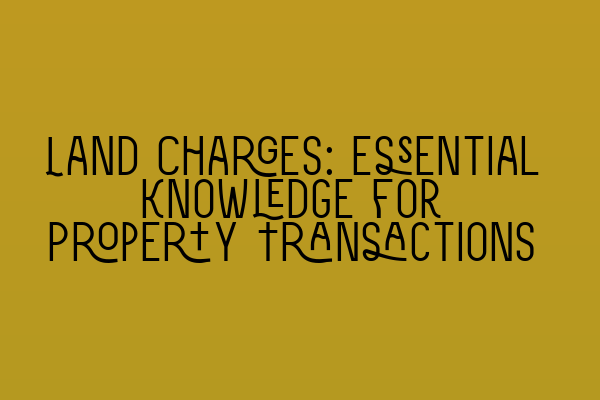Land Charges: Essential Knowledge for Property Transactions
Welcome to another blog post by SQE Property Law & Land Law! Today, we will be discussing an important topic in property transactions – land charges. Understanding land charges is essential for anyone involved in property law, whether you’re a solicitor, buyer, or seller.
What are Land Charges?
Land charges are the rights or interests that are registered against a property. These charges can affect the owner’s ability to sell or mortgage the property. They are usually created by statute and placed on the register of the property, which is maintained by the Land Charges Department. It is important to conduct thorough searches to identify any existing land charges when buying or selling a property.
Types of Land Charges
There are several types of land charges that you should be aware of:
- Mortgages: A charge registered against a property by a lender who has provided a mortgage loan. This charge is typically paid off when the mortgage is repaid.
- Restrictive Covenants: These are conditions or restrictions placed on the use of the property. They can affect things like building modifications, sub-division of land, or business activities conducted on the property.
- Notices and Restrictions: Notices can be registered to protect third-party interests, such as a notice of bankruptcy or pending litigation. Restrictions, on the other hand, can prevent certain transactions unless specific conditions are met.
- Easements: Easements grant rights of way or access across the property. Common examples include utility easements, allowing service providers to access utility lines.
Importance of Land Charge Searches
Performing thorough land charge searches is crucial before entering into any property transaction. These searches help identify any encumbrances or limitations on the property that could impact the buyer or lender.
By conducting land charge searches, you can:
- Ensure a clear title: Identify any charges that need to be removed or satisfied before completing the transaction.
- Assess financial obligations: Determine the outstanding debts or mortgages on the property that need to be settled.
- Evaluate property usage: Understand any restrictions or conditions that may affect your intended use of the property.
- Protect against surprises: Avoid unexpected complications or financial burdens by uncovering any hidden charges or interests.
Take the SQE 1 Practice Exam Questions or SQE 1 Practice Mocks FLK1 FLK2 to test your knowledge about land charges.
Conclusion
Land charges are a critical aspect of property law, impacting the rights and interests of property owners. It is essential for solicitors, buyers, and sellers to have a thorough understanding of land charges and conduct comprehensive searches to avoid any potential issues or complications in property transactions.
For more information and resources on SQE exam preparation, please check out our SQE 2 Preparation Courses or SQE 1 Preparation Courses. Stay updated with the latest SRA SQE Exam Dates too!
